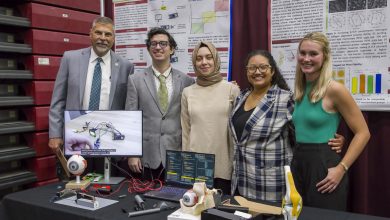Florida Tech Advancing Airport Security Through Biometrics
A passenger walks through an airport, stopping at a security checkpoint for a moment before going to her gate. Instead of a driver’s license and boarding pass, her physical presence will provide all the data screeners need. This scenario may sound like something from science fiction, but Florida Tech researchers are working to make it a reality.

Florida Tech is currently conducting research funded by an $80,000 grant from Collins Aerospace (formerly Rockwell Collins) on “multi-location passenger re-identification.” The goal is to create what Michael King, associate professor in the Department of Computer Engineering and Sciences and the lead researcher, calls “frictionless travel” – ultimately, eliminating the need for passengers to present travel documents at all.
King, who has led several advanced biometrics-related efforts for the U.S. government since 2002, has seen an evolution in how the technology is used: from early applications for gaining access to computer systems and buildings in controlled settings to being developed to identify potential terrorists in surveillance footage after the Sept. 11, 2001, attacks.
With this research, King is examining how biometric technology can be better leveraged to significantly improve the travel experience for passengers while offering airlines and governing authorities a high level of assurance as to the identity of the traveler and enhancing public safety.
For the project, King and his team are analyzing mainstream as well as more advanced forms of biometric technology to conceptualize designs for document-free passenger identification without compromising security.
A vital element of the experience will be biometric-based security, which uses the unique nature of our body – our faces and eyes, for example – to confirm our identity and allow passage through security checkpoints and onto our flight. In November 2018, Delta Air Lines became the first in the nation to implement facial recognition for boarding, using it at its terminal in Atlanta. According to Delta, facial recognition saves an average of two seconds per passenger and nine minutes overall for boarding a wide-body plane.
King sees airports and major transportation hubs leaning on biometric technology to validate the identity of a traveler if certain instances, like registered traveler programs such as TSA Precheck, where passengers have already gone through a vetting process, and utilizing employees to provide additional vetting for those who have not. While there will always be alternative means of identifying an individual, King believes continued advancements to biometrics technology will ultimately ease the burden and risk of error imposed on dedicated security agents having to verify the identity of thousands of passengers every day using driver’s license-sized photos.
“This grant from Collins Aerospace provides our students with a unique opportunity and challenges them to discover new ways of identifying travelers as they enter a facility and later re-establishing their identity at various points as they make their way from the initial checkpoint along the migration path to their gate area,” King said. “More conventional biometric technologies are likely to be employed to establish an initial identity, but then less intrusive technologies known as soft biometric measures, like the way a person walks or their physical form, may then be used to re-identify them later.
“While there remain years of research and development before this vision materializes, I believe strongly that the use of biometrics technology will continue to grow as people become increasingly comfortable with it,” King continued. “A properly implemented system will provide a high degree of assurance of the person’s true identity while significantly reducing the level of effort required of the passenger. Just being present is enough.”
###





